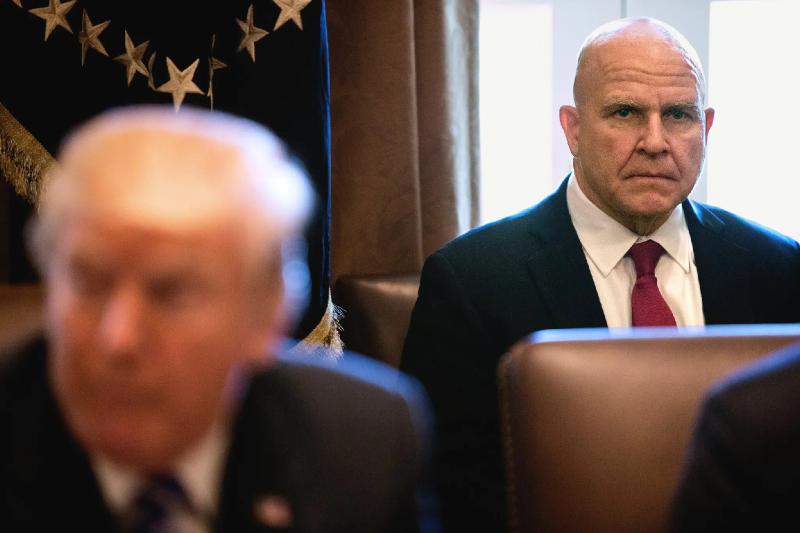H.R. McMaster Doesn’t Think Donald Trump Is Very Good at Making Deals


AT WAR WITH OURSELVES: My Tour of Duty in the Trump White House , by H.R. McMaster
Recently on the campaign trail, Donald Trump has talked up his aggressive stance on China, positioning himself as a tough negotiator in a brutal trade war . But a new memoir by Lt. Gen. H.R. McMaster, one of Trump’s national security advisers, throws that narrative, and many other stories that Trump tells about his time in office, into stark relief.
As McMaster writes in “At War With Ourselves,” the president could sometimes be kept on the straight and narrow with a clever dose of reverse psychology (Xi Jinping wants you to say this, Xi Jinping wants you to say that). But just as often, McMaster shows Trump to have been an unpredictable waffler who undermined himself to the advantage of his competitors on the world stage.
In November 2017, President Trump visited China on the third leg of a 13-day trip around Asia. It was his “most consequential” destination, McMaster explains. As they flew to Beijing, he warned Trump that Xi would try to trick him into saying something that was good for China, but bad for the United States and its allies. “The C.C.P.’s favorite phrase, ‘win-win,’” he recalls telling his boss at one point, “actually meant that China won twice.”
Trump seemed to hear him, but in the Great Hall of the People, the president strayed from his talking points. He agreed with Xi that military exercises in South Korea were “provocative” and a “waste of money” and suggested that China might have a legitimate claim to Japan’s Senkaku Islands. McMaster, his stomach sinking, passed a note to Gen. John Kelly, the chief of staff: Xi “ate our lunch,” it read.
Flattery and pomp from leaders like Xi, Turkey’s Recep Tayyip Erdogan and the Russian president Vladimir V. Putin seem to have been all that was required to get in Trump’s good graces. In 2018, McMaster found Trump in the Oval Office scrawling a cheerful note to Putin across a New York Post article reporting that the Russian president had denigrated the American political system but called Trump a good listener. Like a child with his Christmas wish list, the leader of the free world asked McMaster to send it to the Kremlin. It was especially bad timing: Evidence was coming to light that Putin had directed an assassination on British soil. McMaster did not forward the note, later explaining to an infuriated Trump that his letter would “reinforce the narrative that you are somehow in the Kremlin’s pocket.”
“At War With Ourselves” is beautifully written and never dull. Its author is as concerned with the commander in chief as he is with the destructive bickering among the president’s deputies who hurled “accusations of disloyalty” in their efforts to reach Trump’s ear. In tale after tale, McMaster shows how the former president allowed his own prejudices and the petty rivalries within his administration to undermine his policy goals in what McMaster terms a “vortex of vitriol.” Trump’s “indiscipline,” he writes, “made him the antagonist in his own story.”
The book is rife with literary references to, among others, Chaucer, Epictetus, Marcus Aurelius and Shakespeare. Steve Bannon, Trump’s chief strategist, is described both as Iago, the soldier villain who plays on his leader’s insecurities in “Othello,” and as one of the “weird sisters” who incite Macbeth with splenetic prophecies.
If McMaster respects the office of the president, the Trump he depicts in the book seems to go out of his way to disrespect it. Time and again, Trump can’t seem to focus on briefings and responds to serious problems with inane suggestions. “Why don’t we just bomb the drugs?” he asks when the conversation turns to Mexico. (McMaster, in an apparent act of self-soothing, suggests that Trump “only” meant to shock his advisers with such statements, but he never seems to ask himself to what end.)
McMaster even traces President Biden’s signature foreign policy failure, the chaotic Afghanistan withdrawal in 2021 , to the “atmosphere of inconsistency” promulgated by Trump. What’s more, with the 2024 presidential election in sight, McMaster questions whether the 78-year-old Trump can still “perform well the sometimes grueling job of president.” He notes that the 13-day trip to Asia “tired” him and stretched his patience — and that was seven years ago.
The confusion and capriciousness that permeate the administration in “At War With Ourselves” are terrifying to consider in retrospect; even more so when one imagines them in the context of today’s world, so close to regional wars in the Middle East and the South China Sea.
The message of the book appears to be that Trump is unsuited for another term, although McMaster, known for what the New Yorker writer Patrick Radden Keefe once described as “strenuous expressions of humility,” never explicitly goes so far as to say so, and he even lays some blame on senior advisers like himself. He does, however, indulge in a few rounds of old-school psychoanalyzing. “Seneca emphasized the need to have control over one’s own mind,” he writes, noting that “Trump’s anxieties and insecurities rendered him vulnerable.”




Meh, first-hand experience is so woke!
Good insight into the WH under Trump.